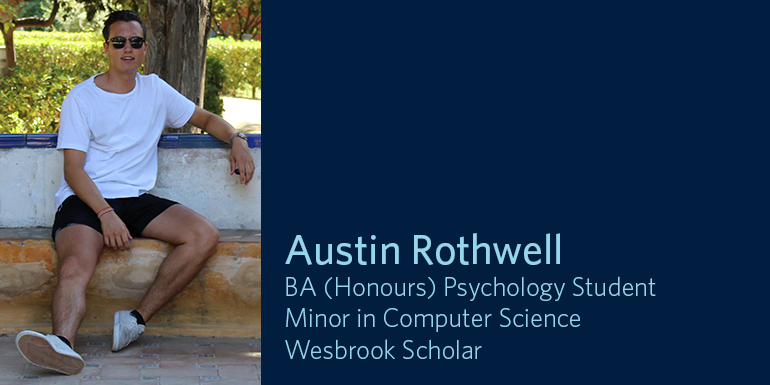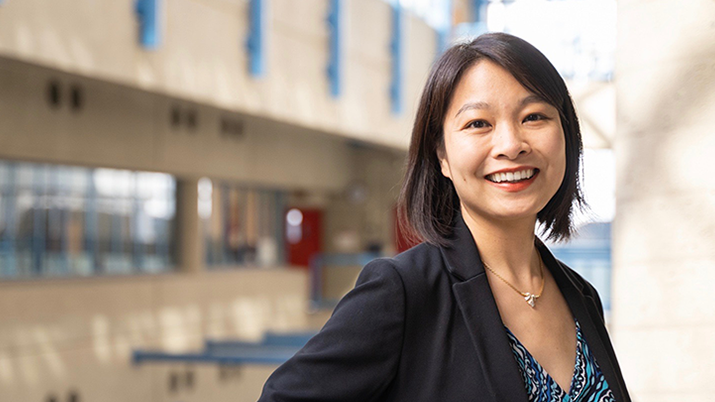

Austin Rothwell is an Honours Psychology student with a minor in Computer Science, but the contributions he’s made to the field of psychology expand far beyond the walls of the classroom. Over his past five years at UBC, Austin has worked as a Research Assistant in numerous psychology labs. He’s also mentored students in both psychology and computer science, all while excelling in his studies and placing on the Dean’s List for several consecutive years.
It comes at no surprise that Austin has won many awards over course of his academic career. Now, he’s got two new esteemed recognitions under his belt: the Wesbrook Scholar designation and the John H. Mitchell Memorial Scholarship. The Premier Undergraduate Scholarships and Wesbrook Scholars are the University’s most prestigious designations, given to senior students with outstanding academic performance, leadership, and involvement in student and community activities. Today, Austin takes time to answer some of our questions.
First of all, can you tell us a bit about yourself?
I’m a 22 year-old from Vancouver, B.C., in my fifth and final year at UBC. I currently work as a Research Assistant in both the Visual Performance and Oculomotor Mobility Lab and the Sensorimotor Systems Lab. I’m interested in the mechanics of eyes and skin. I am also a Teaching Assistant in the department of Computer Science, where I teach students programming principles.
Why did you choose psychology?
When I arrived at UBC fresh from high school, I had no clue what I wanted to do. After taking classes in a variety of fields during my first year, I found Psychology to be interesting, so I went with it!
Do you have any advice for students considering the Honours program in psychology?
Do it! Beyond all the research and writing experience you get in the Honours program, you also get to make friends with other like-minded students who are working toward similar goals. It is really a program that teaches life lessons rather than specific research skills. So if you are set on going to grad school, considering research as a career, or just want to have some fun in a research lab, you should definitely apply.
Is there a single most important moment that has stood out for you during your time as a psychology student?
The most important moment for me as a Psychology student was realizing that I did not have to spend all my time immersed in Psychology. Let me explain. During the first years of my undergrad, I mistakenly believed that except for unrelated electives, I would be stuck taking classes within the field of my selected major. What I eventually realized (and wish I had realized earlier), is that Psychology is so diverse that it can easily mesh with many other fields. Instead of taking random electives, Psychology can be paired with an alternate field to mutually enhance one another, whether it is Economics, Computer Science, Sociology or any other area of interest. Psychology doesn’t have to be a stand alone major; it is best served alongside other fields.
What is your favourite class, and why?
My favourite class was Psychology 367, Sensory Systems with Dr. Miriam Spering. In this class we got to trace the flow of information from the beginning of each sensory system all the way to higher areas within the brain where information is combined and processed. It was fascinating. With a soft and comforting German accent, my professor shared her wealth of knowledge with the class in a relaxing yet interesting way. I would recommend this course to anyone regardless of background!
Which academic and professional achievements are you most proud of?
I’m proud of many achievements over the undergrad years, but what stands out for me are the two NSERC undergraduate student research awards I received, along with three outstanding poster presentation awards. Highlights also included being awarded the Morris Belkin prize for the best fourth year Honours thesis, and earning a Certificate of Excellence from the Canadian Psychological Association. Of course, the Wesbrook Scholar designation and the John H Mitchell Memorial Scholarship definitely take the cake! Most recently, I was accepted to present my research at the Vision Science Society Conference in Florida. I’m proud of that too. But, to be honest, my biggest achievement is getting my 6 literature requirement credits without reading a single book!
What advice do you have for students on how to carve their own academic path?
Take risks! Do fun things! There are many opportunities available for students to take advantage of. Wake up early, get some exercise, and do whatever excites you. Do this for a couple years, look back, and I bet you will have carved an exciting academic path.
What do you do when you’re not studying?
To make up for life lost to studying, I try to have as much fun as possible outside of the classroom. Born and raised in Vancouver, I love spending time in the mountains and on the ocean. During the winter I ski every week and during the summer I mountain bike and hike. In addition, I spend time sailing, road cycling, and driving cars. I also love eating ramen.
What are your plans after graduating?
This fall I will begin a Masters in Computer Science at UBC in the Sensorimotor Systems Lab. I will be investigating and building computational models of skin and eye movements. I also plan on buying my friend Nick a Corona to celebrate my graduation.


